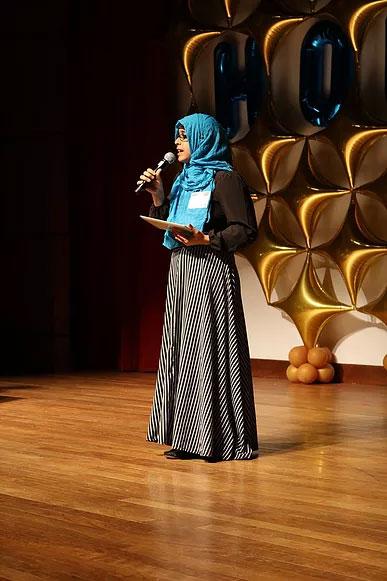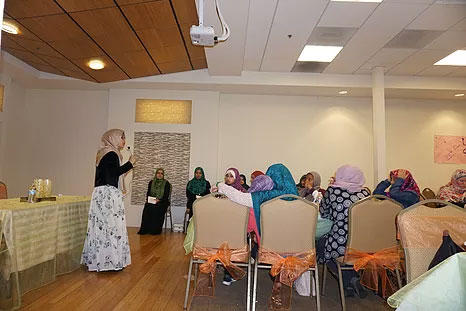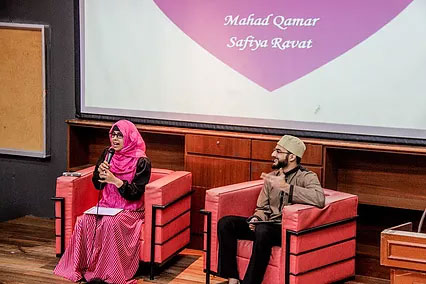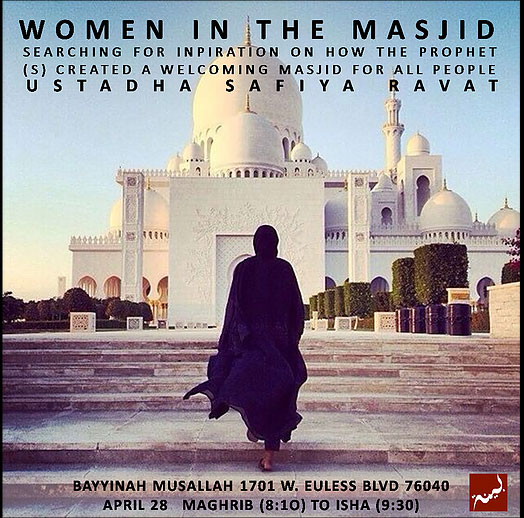Ustadha Safiya Ravat is an instructor of Islamic Studies at Bayyinah. She and her husband recently graduated from the International Islamic University of Malaysia with Degrees in Islamic Studies. She’s originally from Houston, but now resides in Dallas, Texas with her husband and their toddler son. Full bio here.

I GOT MARRIED quite young; I was 18, and my husband was 19. We met in an Islamic Studies program and both volunteered with the youth organizations in our community. After marriage, we continued pursuing our college degrees; I was studying journalism, and my husband was on the med school track. Eventually, we wound up studying Arabic at Bayyinah. After extensive research, we chose the International Islamic University of Malaysia, and in 2013, we started our bachelor’s degree in Fiqh and Usul ul Fiqh.
IT WAS A UNIVERSITY where many of the professors were women who really put forth this idea that women scholarship was not only conventional but necessary – rather than something out of the ordinary. Our classes were mixed, and I remember being shocked because that wasn’t the standard in Islamic settings in the U.S. I was so excited to bring that fervor for women scholarship back home and teach it. I felt like I unlocked a treasure during my time there.
I EXPECTED MY ISLAMIC STUDIES DEGREE to make me more strict or more rigid, but the number one thing I learned was mercy and open-mindedness. There are so many opinions and ways to look at certain issues. It broadened our understanding by teaching us how to look at hadith and Quran and discern when certain interpretations are culturally biased.
I HAVE THIS AMAZING RESOURCE called Tahrir al-Mar’ah fi ‘Asr al Resaleh (The Liberation of Women in The Time of The Message). The author was a scholar who was taught fiqh – things like technicalities of divorce, women’s rights, etc. However, after delving into ahadith with nuanced stories of women, he understood women played a much larger role in society than we think. Women made i’tikaf in the masjid – without their husbands there! They worked; they were bosses with male employees, they were the breadwinners of their families and they fought on the battlefield. He decided to change the name and mission of his book and show through these authentic ahadith the true narrative of Muslim women.
I REMEMBER THINKING, “I’m not going be that woman who only talks about women’s issues.”I learned that a lot of women have questions about things they don’t understand in our religion, but feel too shy to ask, or feel as though it’s blasphemous to be doubtful about certain things. The reality is, the majority of shuyookh are men which either makes them unapproachable or makes asking certain questions super awkward. When I came back home and stood in front of students, I found women were more comfortable to approach me and ask questions to seek understanding and clarity.

I REALIZE HOW IMPORTANT IT IS to study women’s issues in Islam and look at the context, intention and background of the ahadith. For example, there’s an oft-quoted hadith about how women should pray in the home – but what was the context, intention, and background? Simply citing that hadith to exploit women and keep them in the home is unacceptable.As a result, we see masajid opening up that are exclusive to women; the consequence of the lack of female and male scholarship examining how mistreated and undervalued women are in society.
WE’VE BEEN GIVEN A NARROW NARRATIVE of women in Islam. But if you just look into our history, you’ll see an entirely different picture of women in Islam than what has been portrayed for so many of us. I decided to embark upon a journey to get all these difficult and doubtful questions that women have about Islam and use the knowledge I learned in Malaysia as well as my own research to find the answer in the Quran and Sunnah – and hopefully broaden the understanding of women in Islam.

I DON’T BELIEVE THERE WAS A BLATANT AGENDA to bring women down, but I learned that it is inevitable that culture, geography and time will inevitably put a bias on people’s work. At times, in an attempt to dismantle patriarchy, people demonize scholars of the past despite their extensive contribution. There is a consensus among many scholars that some rules should be revisited. Women’s and family issues especially need to be looked at with a different lens and examine how we can apply the Prophet (S)’s understandings to the circumstances today. However, it’s imperative we establish where we can do that; it would not be in texts regarding worship or definitive rulings but in texts relating to ‘mu3amalat’ or the general interactions that one has in their daily life, where the fiqh has flexibility.
THE MASJID OF THE PROPHET (S) had no barrier between men and women, and he held discussions with both men and women. There are very specific authentic hadith that acknowledge the access women had to the Prophet (S), which is something hardly any of us have today with our religious leaders. When women don’t have that access, and they have no one advocating for them, they’ll find their own solution – even though they lack the necessary knowledge base to do so. That itself should be a wake-up call that we need to revisit the texts, and quickly, because these other interpretations are coming up even faster. We need to work hard and efficiently to deduce the correct understanding with the precise foundation using proper sources.
ONE OF MY VERY FIRST TALKS I’ve given as a Bayyinah instructor was on women in the masjid. After my talk, a woman came up to me and said, “I was really considering going to one of those ‘women only’ masajid but now that I know that the masjid of the Prophet (S) valued women and that women had a voice and they were looked upon as humans and not as a distraction, I want to go back to my masjid and realign it with the prophetic model.” That moment was the aha moment in my life.

1111 Conrad Sauer Dr, Houston, TX 77043, USA | info@suhbah.com
© 2025 SUHBAH INSTITUTE. All rights reserved.